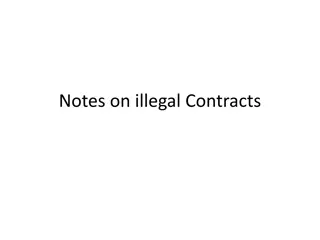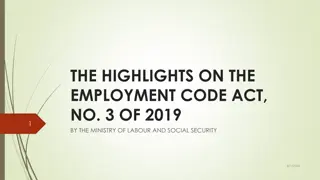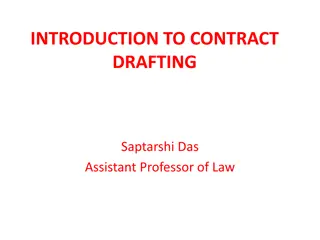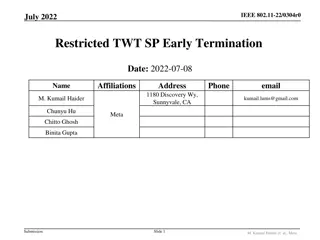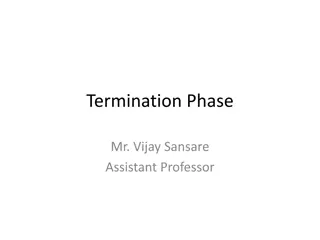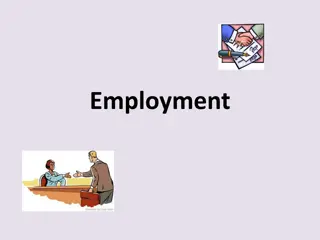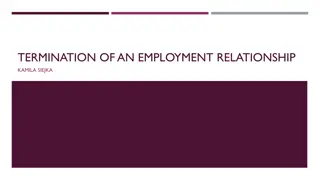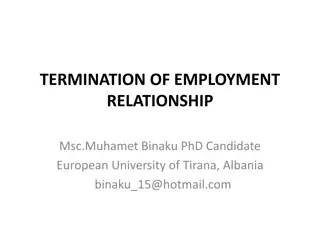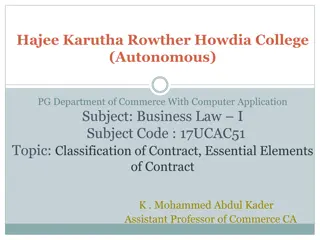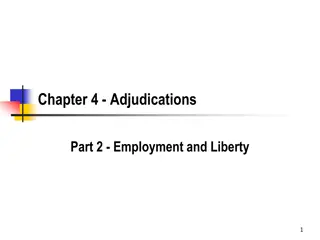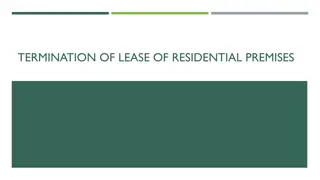Understanding Termination of Employment Contracts
Termination of employment contracts can occur through various means such as termination or dismissal. Termination allows parties to end the contract with notice, while dismissal is a disciplinary measure. Contracts can also be terminated by operation of law or by mutual agreement between parties. Death of a worker and frustration of the contract are also discussed as scenarios leading to termination. Knowing the difference between termination and dismissal is crucial for both employers and employees in the employment relationship.
- Termination of Employment
- Contract Law
- Operation of Law
- Termination vs Dismissal
- Frustration of Contract
Uploaded on Jul 14, 2024 | 0 Views
Download Presentation

Please find below an Image/Link to download the presentation.
The content on the website is provided AS IS for your information and personal use only. It may not be sold, licensed, or shared on other websites without obtaining consent from the author. Download presentation by click this link. If you encounter any issues during the download, it is possible that the publisher has removed the file from their server.
E N D
Presentation Transcript
Labour L Labour La aw I w I TERMINATION OF A CONTRACT OF EMPLOYMENT.
Termination of the contract of employment. Termination of the contract of employment. Termination vs dismissal: Termination allows the parties to bring the COE to an end at any time with valid notices and the employee may still be entitled to certain benefits Dismissal is a disciplinary measure and the employee usually forfeits any benefits.
Termination of Contract of Employment Termination of Contract of Employment Contract of employment can be terminated in various ways including by: operation of law, intention of the parties; and By notice given by any of the parties.
Operation of Law Operation of Law 1. Death: The death of the worker most definitely leads to the termination of the contract of employment from the moment of his death. Section 9(7)(b) Labour Act provides that a contract shall be terminated by the death of the worker before the expiry of the stipulated period of employment. This is because a contract of service is a personal contract.
1. Death 1. Death The contract is terminated from the time of death hence any right that accrues to the worker before this time is enforceable. The termination shall therefore be without prejudice to the rights of the personal representatives or dependants of the worker to make legal claims for his rights and benefits that accrued before his death (S. 9(8) Labour Act)
2. Frustration of the Contract I. 2. Frustration of the Contract I. this occurs where a contract of employment becomes impossible to perform. Frustration of a contract refers to the premature determination of an agreement lawfully entered into between parties which, owing to the occurrence of an intervening event or change so fundamental during its operation, as to be regarded by law, both as striking at the root of the agreement and as entirely beyond what was contemplated by the parties when they entered into the agreement
Frustration of the Contract II Frustration of the Contract II It occurs where after the contract, events occur which make the performance of the contract impossible, illegal or radically different from what was in the contemplation of the parties. These events include: subsequent legal changes, destruction of the subject matter of the contract, outbreak of war and government requisition of the subject mater of contract
Frustration of the Contract III Frustration of the Contract III the death of an enterprise or business where a company is dissolved, goes bankrupt, is liquidated or a partnership is dissolved. The sale of a business may also have the same effect. In Nokes v. Doncaster Amalgamated Collieries Ltd (1940) AC 1014, the taking over of a company was held to have determined a miner s employment and thus he could no longer be liable for an offence which only a servant could commit.
Frustration of the Contract IV Frustration of the Contract IV Any other supervening event that makes the contract impossible to perform will also frustrate the contract. For instance a contract of apprenticeship will be frustrated if the subject matter of the instruction is destroyed. innate inability, illness or injury if it is of such a nature or long period as to adversely affect the performance of the contract of employment. This can be any physical or mental incapacity. Such illness or injury of this nature is a however a question of fact and where it is of a temporary nature, it will not be sufficient to terminate the contract of employment.
Condor v. Barron Knights Ltd (1996) 1 WLR 87 Condor v. Barron Knights Ltd (1996) 1 WLR 87 a member of a pop musical group collapsed due to the strenuous nature of their job. The terms of contract stipulated that he was to perform in the defendant s band seven days a week as a drummer and also feature as a star performer. After a medical examination, it was certified that he could not work for 7 days a week but only 4. This was unsuitable for the defendant s business and he dismissed the plaintiff on the ground of illness even though his contract contained a non-dismissal clause. In an action for damages for wrongful dismissal, the court held that the dismissal was lawful since the plaintiff's health made it impossible in the business sense for him to perform his obligations.
Frustration of the Contract V Frustration of the Contract V Under common law, an employer is at liberty to terminate the employment of a seriously sick or incapacitated worker. Under section 16 of the Labour Act, a worker is entitled to be paid wages for up to 12 working days in any one calendar year during absence of work caused by temporary illness certified by a registered medical practitioner. However, the worker must be ready to continue his work except for the incapacity produced by the illness and the employer is at liberty to request that the worker be examined by a qualified medical practitioner nominated by him.
Intention of the Parties Intention of the Parties Expiration of time: an employment for a fixed period of time will be terminated automatically at the expiration of such period in the absence of any extension of the employment. See section 9(7)(a) Labour Act. An employment for a fixed period needs no formal notice of termination and the effluxion of time or performance/completion of the job automatically discharges the contract
Intention of the Parties II Intention of the Parties II Terms of the Contract: parties to a contract of employment can include the mode or way by which the contract may be determined in so far as it was voluntarily made. This is usually spelled out expressly in the contract or as stipulated in the industry or trade. For instance the contract may be stipulated to come to an end once it has been performed or on some other mutual conditions agreed upon by the parties. Where the parties mutually agree to a new agreement, this terminates the previous contract of employment.
Strange (S.W) Ltd v. Mann (1965) 1 AUER 1069 Strange (S.W) Ltd v. Mann (1965) 1 AUER 1069 The respondent was employed as a manager by the plaintiff. His COE contained a clause which prevented him from carrying on business of a similar nature within 12 miles of the company for 3 years after cessation of his service. Due to a disagreement, the parties mutually agreed that the defendant should relinquish his position and be appointed as manager for the credit department. 27 days after his new appointment, he was dismissed without notice. The defendant took up a job with another company within the restricted area. The plaintiff sued in order to enforce the restrictive covenant. The court held that the new appointment replaced the original agreement which has ceased to subsist.
Intention of the Parties III Intention of the Parties III Notice Given by Any of the Parties: 1.Resignation by the Worker: a contract may also be determined by the unilateral act of one of the parties. A worker has an absolute right to resign from his employment and this has been identified as the difference between a servant and a slave (per Lord Atkin in Nokes v. Doncaster Amalgamated Collieries Ltd (1940) AC 1014).
Resignation by the Worker Resignation by the Worker In T.O.S Benson v. Onitiri (1960) 5 FSC 61, 82, the Supreme Court affirmed that a person has an absolute right to resign and no discretion lies in the employer to refuse to accept the resignation. To do so would amount to forced/compulsory labour contrary to the freedom to contract and the fundamental right to dignity of human person under section 34(1)(c ) of the constitution. Even where it is a pensionable employment, once the worker has fulfilled all the necessary conditions to be entitled to retirement benefits, he can still voluntarily resign and be entitled to his retirement benefits.
Resignation by the Worker Resignation by the Worker Once the resignation becomes effective, the employment has been terminated and no disciplinary action can be initiated against the worker. The contract of employment usually stipulates the required period of notice the worker may give to the employer upon his resignation or amount of payment in lieu of notice.
Termination by the Employer I Termination by the Employer I An employer can terminate the employment upon notice to the worker. However (a) such a dismissal must be for all or any of the reasons express or implied in the contract of employment; (b)proper notice must be given to the worker; and ( c) the proper method of dismissal or termination of employment must be followed. The employer has the right to terminate the contract of employment, however such a termination must be lawful.
Termination by the Employer II Termination by the Employer II Article 4 of the ILO Termination of Employment Convention 1982 stipulates as follows: the employment of a worker shall not be terminated unless there is a valid reason for such termination connected with the capacity or conduct of the worker or based on operational requirement of the undertaking, establishment or service . Therefore it can be determined due to the inefficiency or lack of competence of the worker, acts of misconduct, or operational requirements like redundancy or economic hardship for the emplo
Termination by the Employer III Termination by the Employer III The exercise of the right of the employer to terminate the employment during a redundancy (excess manpower) is governed by section 20 of the Labour Act. Redundancy means an involuntary and permanent loss of employment caused by an excess of manpower (s. 20(3) LA). The principle of last in, first out is to be adopted in dismissing workers subject to all factors of relative merit including skill, ability and reliability.
Termination by the Employer IV Termination by the Employer IV The employer shall also inform the trade union or worker s representatives of the reasons of and the extent of the redundancy. He shall also use his best endeavours to negotiate redundancy payments to the discharged workers.
Notice of Termination Notice of Termination Except a contract is determined by death or effluxion of time, some notice is required to terminate the employment whether on the part of the worker or that of the employer. Either party to a contract of employment may terminate the contract on the expiration of notice given by him to the other part of his intention to do so (s.11(1) LA). Notice here refers to a formal notification or information by the party seeking to terminate the contract to the other party that the contract is to be brought to an end at a specified date and sometimes (especially if it is given by the employer) the reason for the termination.
O.A. Martins v. Braithwaite (Insurance Brokers) O.A. Martins v. Braithwaite (Insurance Brokers) & Co & Co Ld Ld (1972) CCHCJ/72 (1972) CCHCJ/72 the defendant company under the contract of employment had the right to terminate the plaintiff's appointment at any time without notice . The defendant in exercising this power terminated the plaintiff s appointment without saying anything to the plaintiff. After two years, the plaintiff instituted this action for arrears of salary which fell due before this action was instituted (he rightly didn t sue for wrongful dismissal). The court granted the claim of the plaintiff and held that the reservation of the right to terminate appointment at any time without notice does not mean that the worker is not to be told in clear words that his services are no longer required. The court therefore held that there had been no valid termination of the employment.
Notice of Termination Notice of Termination Even though notice of termination, resignation or retirement has been given, the worker remains in the service of the employer till the notice expires and can therefore be disciplined or summarily dismissed within this period. He is also entitled to all his benefits till the contract is actually terminated even though notice has been given
Amokeodo v. IGP Amokeodo v. IGP (1999) 6 NWLR ( (1999) 6 NWLR (pt pt 607) 467 607) 467 the plaintiff, a superintendent of police, was dismissed retroactively from Dec 10 1987 by a letter dated Feb 1 1989. This dismissal was held to be ineffective and the plaintiff ordered to be reinstalled to his post with effect from Dec 10 1987. The plaintiff gave a notice of his intention to retire in Nov 1989 but before the notice expired, he was dismissed from service under the Pubic Officers (Special Provisions) Act 1984.
Amokeodo v. IGP Amokeodo v. IGP (1999) 6 NWLR ( (1999) 6 NWLR (pt pt 607) 467 607) 467 On suing for this, the court held that he remained in the service until the expiration of his three months notice within which period he was subject to all the benefits and advantages an officer of his rank was entitled to as well as any disciplinary measures that his employers deems necessary to maintain generally on a serving officer. Therefore the dismissal of the appellant within the period of his retirement notice is the exercise of the employer s right over its serving officers.
Notice of Termination Notice of Termination Where a contract specifies the period of notice and form, these must be complied with for the notice to be valid. The notice must be specific and unequivocal. Note that time begins to run when the notice is served on the other party
Notice of Termination Notice of Termination In Adeniran A. Adeyemo v. Oyo State Public Service Commission (1979) 1 FNR 28, the contract provided for notice of 1 month, the court held that the employer could not terminate the contract on the basis of a 30 days notice. Note that one month s notice is different from 30 days notice in law. If a one month s notice is served on a day other than the first day of the month it will be ineffective unless it extend to cover the end of the following month (see Oyekoya v. GB Ollivant (nig) Ltd (1969) 1 All NLR 80).
Notice of Termination Notice of Termination A Contract Of Employment terminates when notice is expired or where payment is made or accepted in lieu - Ben Chukwuma v Shell (1993) 4 NWLR (pt 289) 512 Withdrawal of Notice is Permitted. See Brindle v HW Smith (1973) 3 All ER 130- notice does not become effective until the day of its expiration or when the employee stops coming to work. It could be withdrawn before it expires provided it has not been accepted by the other party. Notice is not required to be accepted by the other party in order to be valid - Resignation need not be formally accepted to be valid .See Yesufu v Gov of Edo State (2001) 26 WRN 121,133
Notice of Termination In the absence of any stipulation in the contract as to the length of the notice, section 11(2) LA provides for the following length of time: (a) one day, where the contract has continued for a period of three months or less; (b) one week, where the contract has continued for more than three months but less than two years; (c) two weeks, where the contract has continued for a period of two years but less than five years; and (d) one month, where the contract has continued for five years or more.
Notice of Termination Notice of Termination The Act requires that any notice that is for a period of one week or more shall be in writing and the period of notice excludes the day on which the notice is given (section 11 (2) & (3) LA). The contract of employment can or usually also provides that payment can be made in lieu of notice (section 11(6) LA). Where this is done, the contract is terminated once the payment has been made. Once notice has been given, some have postulated that it may not be withdrawn without the consent of the other party. However note that as stated earlier, a notice of resignation or retirement need not be accepted by the employer otherwise to insist on this requirement would amount to forced labour
Notice of Termination Notice of Termination Whatever may be the mode of termination of employment, the proper procedure must be followed and must also be exercised by the proper person vested with this right/power by the contract or law. Where the length of notice for termination of a contract of service was not predetermined by the parties, the common law rule applies. That rule is that the court will presume that a contract of service is to terminate by reasonable notice given by either party.
Notice of Termination Notice of Termination What amounts to reasonable notice will depend on a. The intention of the parties as revealed by the terms of the contract; b. The nature of the contract c. The status of the employee in the establishment. The court could also have recourse to the custom of the trade to determine what is reasonable notice. Thus, the higher the position held by the employee, the larger his salary, the longer will be the notice required to put his contract to an end (see in S.S.Co Ltd v. Afropak Nig Ltd (2008) 18 NWLR [1118] 77)
Valid Termination Valid Termination Termination must be lawful: It must be for a reason stated in COE Proper notice must be given The agreed procedure of termination must be employed The power to terminate must be exercised appropriately. See Hart v Gov Rivers State (1976) 11 SC 211 the governor assumed the power vested in the civil service commission and the SC declared the action of dismissal as invalid. Where no method is agreed, a reasonable method should be adopted Article 4, International Labour Organisation(ILO) TOE Convention 1982 - the employment of a worker shall not be terminated unless there is a valid reason connected with capacity, conduct or based on operational requirement of the service 34
Termination of Employment by Summary Termination of Employment by Summary Dismissal Dismissal Despite the requirement for a notice before termination of an employment, either of the parties still has the right to terminate the contract without notice by reason of such conduct by the other party that would enable him to treat the contract as repudiated (S. 11(5) LA). Dismissal refers to discharge from service or office. Summary dismissal refers to a termination of the contract of employment by the employer without notice and it usually takes immediate effect. Dismissal from employment carries a stigma with it in and the worker is deprived of his benefits unlike retirement.
Termination of Employment by Summary Termination of Employment by Summary Dismissal Dismissal An employer has a right to summarily dismiss a worker for gross misconduct which includes willful disobedience to lawful and reasonable orders, neglect and conduct incompatible with the master s business or worker s duties. This right is exercisable whether the contract is for a fixed term or not and is viewed to be implied in the contract of employment. It can also be viewed as a power to rescind the contract upon a serious fundamental breach by the worker which goes to the root of the contract. Such a worker therefore loses his entitlement to notice or payment in lieu of notice by his gross misconduct.
Termination of Employment by Summary Termination of Employment by Summary Dismissal Dismissal A master has full powers to terminate the employment of his servant at any time, for any reason or indeed for no reason at all provided the termination follows the procedure spelt out in the contract of service; otherwise the master will be liable in damages for the breach of contract.
Termination of Employment by Summary Termination of Employment by Summary Dismissal Dismissal Gross misconduct is a conduct of a grave and weighty character as to undermine the confidence which should exist between the employee and his employer or working against the deep interest of the employer (see U.B.N Plc v. Soares (2012) 11 NWLR (pt 1312) 550) Misconduct is viewed seriously and punished harshly. Any act outside the scope of any employee s duties in his employer s establishment which is prejudicial to the latter s interest is willful misconduct.
U.B.N U.B.N Plc v. 550 550 Plc v. Soares Soares (2012) 11 (2012) 11 NWLR NWLR (pt 1312) (pt 1312) The respondent led other staff of the appellant in a strike action contrary to his contract of employment. The respondent and others involved in the strike action where consequently dismissed. All other staff involved in the strike action later wrote letters of apology on the basis of which the appellant allowed them to resign their appointments thereby entitling them to gratuity and pension. The respondent failed to write an apology and rather sued for wrongful dismissal.
U.B.N U.B.N Plc v. 550 550 Plc v. Soares Soares (2012) 11 (2012) 11 NWLR NWLR (pt 1312) (pt 1312) The trial court found in favour of the respondent but this decision was upturned at the court of appeal. The court of appeal held that: Willful disobedience of a lawful and reasonable order of an employer by an employee is a definite act of misconduct, which at common law, attracts the penalty of summary dismissal, because such willful disobedience is a reflection of a total disregard of an essential condition of a contract of service, namely, that the servant must obey a proper, responsible and lawful order of the master, in default of which their contractual relationship cannot be expected to continue.
Termination of Employment by Summary Termination of Employment by Summary Dismissal Dismissal However, the employer who acquiesces or has waived this right cannot seek to exercise same right later. Ademola CJN stated in Electricity Corporation of Nigeria v. George Micol (1969) NMLR 265, 269 that: it is settled law that if a master did not complain and appeared to be satisfied with a servant s conduct, that complaint cannot be a ground for dismissal on a subsequent occasion . Before the employer s act can amount to condonation, he must have known about the misconduct and done nothing about it.
Termination of Employment by Summary Termination of Employment by Summary Dismissal Dismissal An employer must give reasons for summarily dismissing a worker. In Nunnink v. Costain Blansevoort Dredging Ltd (1960) LLR 90, the court held that where an employer dismissed a worker for incompetence, the onus was on the employer to prove the incompetence of the worker.
Termination of Employment by Summary Termination of Employment by Summary Dismissal Dismissal The exercise of the power of summary dismissal is also subject to the principles of natural justice (audi alterem partem and nemo judat in causa sua). This is particularly so for where the employment is one with statutory flavour or the procedure for summary dismissal is stipulated in the contract of employment. It also applies where the employee is to be dismissed for gross misconduct bordering on criminality The employee must be tried by an independent tribunal and also given the opportunity to defend himself.
Termination of Employment by Summary Termination of Employment by Summary Dismissal Dismissal The worker must know the allegations against him and the supporting evidence and thereafter be allowed to defend himself. Even where a preliminary inquiry was made by a board, the report of such a board alone cannot be the basis of a summary dismissal in the absence of the worker having an opportunity to defend himself (see A.I Wilson v. AG of Bendel State & Ors (1985) 2 NWLR (pt 4) 572).
Termination of Employment by Summary Termination of Employment by Summary Dismissal Dismissal Note that mere participation in the proceedings of an inquiry or giving evidence before it does not necessarily constitute fair hearing as required by section 36 of the constitution. Oputa JSC stated in Garba & Ors v. University of Maiduguri (1986) 1 NWLR (pt 18) 550 that the courts have always drawn the vital difference and distinction between hearing a man as a witness in an administrative inquiry and hearing him in defence of his good name, his integrity or his conduct . Where the worker is not given fair hearing, the court will set aside the dismissal.
Motive for Termination of Employment Motive for Termination of Employment The law does not consider the motive behind the termination of employment; it only considers whether the termination was wrongful or not (i.e whether due process was followed) In Nfor v. Ashaka Cement Co. Ltd (1994) 1 NWLR (pt319) 222, the plaintiff was paid 3 months salary in lieu of notice at the time of termination of her employment as stipulated under his coe. He sued for a declaration and damages. The court held that he was not entitled to the reliefs sought and stated that once a contract of employment is legally terminated, motive is irrelevant in common law contract of employment.
Suspension of Contract of Employment Suspension of Contract of Employment This is the state of affairs where a contract of employment is still in force but there is neither work being done in pursuance of it nor remuneration being paid under the agreement. It is a temporary deprivation, cessation or stoppage of the privileges and rights of an employee. Suspension of the employee can take place as a disciplinary measure against an erring employee It can also occur in order for the employer to decide or investigate allegations of misconduct made against an employee.
Suspension of Contract of Employment Suspension of Contract of Employment Suspension is not the same as dismissal or termination of employment; it is only putting the contract of employment on hold Some employees may be put on full or half salaries during this period and some may not be paid at all.
Termination of Employment with Statutory Termination of Employment with Statutory Flavour Flavour Where a worker is employed pursuant to a statute or regulation, then such an employment is deemed to have a statutory flavor. This type of employment is regulated by statutes and not just common law rules that govern the master/servant relationship. An employee with such an employment can only be disciplined and the appointment terminated according to the procedure provided in the statutes. Therefore, employment with statutory flavor enjoys a special status higher than the ordinary master/ servant relationship.
Termination of Employment with Statutory Termination of Employment with Statutory Flavour Flavour Where the laid down procedure is not followed such act of discipline or determination is null and void and of no effect. Generally, employment in the private sector is that of a master and servant while in the public/civil service it is usually with statutory flavor.






